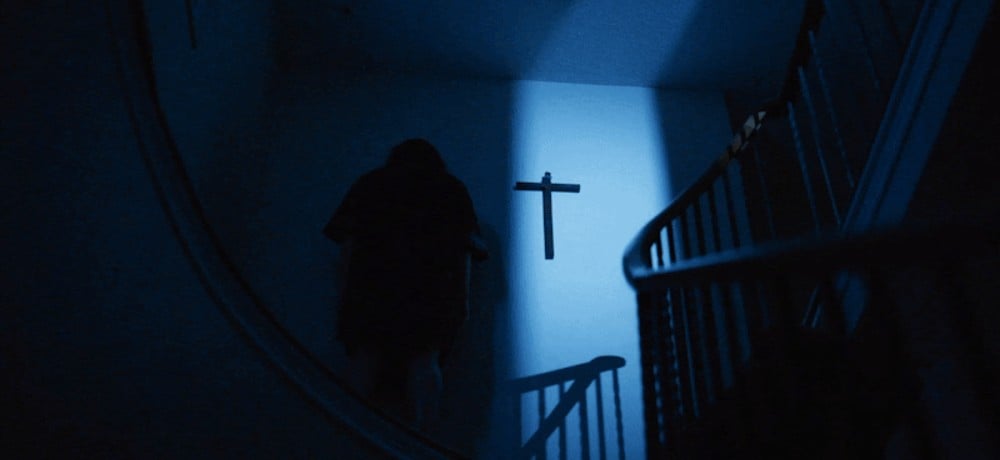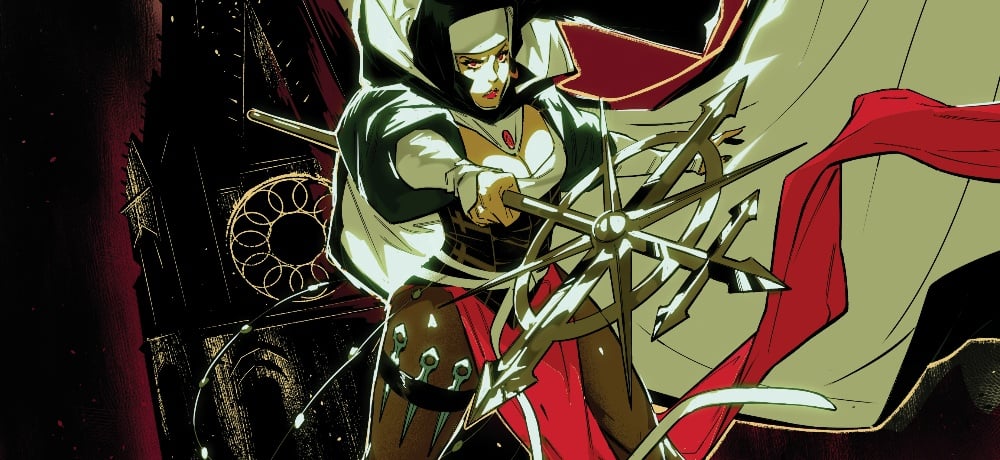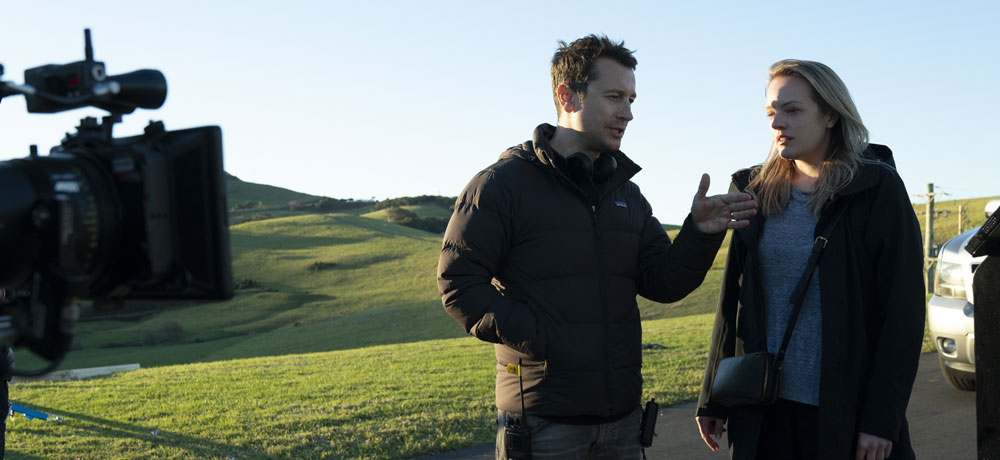






Arriving in theaters this weekend is Leigh Whannell’s The Invisible Man (2020), which takes the classic sci-fi horror tale and brings it into the 21st century. The film follows a woman named Cecilia Kass (played by Elisabeth Moss), who has escaped the clutches of her abusive boyfriend, Adrian (Oliver Jackson-Cohen), only to learn a short time later that he’s committed suicide and left her a great deal of money. But as Cecilia begins to try and settle into her new life, one where she doesn’t have to live in constant fear of Adrian, she begins to suspect her ex isn’t actually dead at all, and has somehow found a way to make himself invisible, allowing him to continue to harass and torment her, leaving Cecilia shaken and questioning her own sanity.
During the recent press day for The Invisible Man, Daily Dead had the opportunity to speak with Whannell about his approach to this new take on the timeless H.G. Wells story, and he discussed how integral Moss was to making sure everything about her character and her plight felt authentic. Whannell also chatted about grounding the science that drives The Invisible Man in reality and the research process he underwent while working on the script, the collaborative process he shared with the film’s composer, Benjamin Wallfisch, and more.
Fantastic job on the film, Leigh. Obviously, you show some love towards the original Invisible Man here, but it also very much becomes its own story as well. I was wondering if you could discuss your approach to the story, in terms of the story elements you wanted to keep, but ultimately, taking this in a completely different direction as well.
Leigh Whannell: Yeah, I mean the very first idea I had when The Invisible Man was suggested to me, it wasn't something that I was pursuing, either, but in that moment, the first thought I had was, "I've got to modernize this character to make him scary again." I didn't have any interest in making anything Gothic or retro. I didn't want any phone machine or lightning bolts over the cemetery. I wanted to make something really clinical, grounded, something that the audience could see themselves in. Like, "This could happen to me tomorrow."
And so to do that, you've just got to take a really loaded approach around everything in tech and make it a character study. That was really how I ended up where I did, just in that very first moment it was like, "I've got to move away from this classic interpretation of the character. I've got to move it away from fantasy and move it into reality."
We had seen some stuff in the trailer, but I didn't quite know how we were going to get to the invisibility that drives this story. And I think what's really interesting is that if you look at Upgrade and examine what you’ve done here with The Invisible Man, they are two very tech-based stories that still feel very plausible and grounded. How deep did you have to go down a rabbit hole to figure out the science behind something like this to make sure that it actually works?
Leigh Whannell: Yeah, it's funny. It always starts off with an idea. The same happened with Upgrade. I had this idea that a quadriplegic person had a computer chip installed in the neck, it would allow them to walk again. It was truly an idea that popped into my head one day. So, during the research period of writing the film, I talked to some surgeons and some scientists and they told me that it's plausible. They told me that the idea of installing a computer chip in somebody's spine is completely plausible. And now actually, I've heard some chatter about Elon Musk wanting to pursue this technology of curing paralysis.
So, these ideas have a weird way of seeping into the world. And with Invisible Man, it was the same thing. I had this idea for the invisibility in the film, and I talked to some scientists in Sydney, Australia during pre-production and they all confirmed that this could be possible if you had the right technology, if you did it the right way. To hear that it was plausible was heartening for me because my entire goal for the movie was reality. I never wanted people to doubt the movie or never check out of the movie because it was just too unbelievable.
Completely understandable. And obviously, a lot of that also comes down to Elisabeth’s performance in this movie, too. I give her so much credit because she's so freaking good in this movie and really sells those moments. And it feels deeply personal because of her performance, too. Can you discuss the collaborative relationship that you two had on this film?
Leigh Whannell: Oh, that's great to hear. Look, Elisabeth, as we all know, is amazingly talented. I've spent the last 10 years with her in my living room on shows like Mad Men and The Handmaid's Tale, so I knew what she was capable of as an actor. That was never in question. What she really helped me with was going deeper into the character, and also she provided a female insight that I didn't have as a male. She would contribute to the writing, too. When we would get to a scene, we would cross examine it all different ways and just make sure that it was as sharp and as real and truthful as it could be. And she was just a great sounding board for that. She was like the mirror of truth and she would hold that mirror up to the script and anything that seemed inauthentic would drop out of the script.
So, I just really thank her for that collaboration and that insight. And I don't think I could have made this film without an actor like Lizzie. Without someone who's willing to contribute like that, I don't think the film would be as strong because you can't have somebody passive just doing what they're told in a role like this. As you said, it's very personal. She goes to some dark places. In order for that to work, the actor needs to be invested wholeheartedly and it needs to be truthful to them. This needed to be truthful to Lizzie for her own life, and that was her biggest contribution of the many that she made to this project.
There's a lot of physicality to Elisabeth’s role here as well. In fact, anybody who has to tangle with your villain in this really goes for it. You really got down and dirty with the mind-blowing stunts for Upgrade, but for Invisible Man, this is so different because you're dealing with almost one-sided stunts here. How different was the process of doing stunts on this versus anything you had done before?
Leigh Whannell: Well, on Upgrade, I was definitely bitten by the action movie bug. It's fun to choreograph stunt scenes, car chases, and fights. It's just viscerally fun to get stunt people involved. We felt very low tech on Upgrade ironically enough, because even though the movie is all about tech, we didn't have a lot of money and we were being scrappy and we were figuring out innovative ways to shoot the fight scenes from a unique perspective. That emboldened me to do that more. If I'm doing a stunt scene in a movie, I don't want to shoot it the same old way it's been done. I want to find something unique. With this movie, I was trying to do something unique, but I wasn't trying to make it fun.
I was actually trying to make the fight scenes and the struggles in this film stressful, because you're seeing the movie through the eyes of Elisabeth's character and you're in her shoes. I wanted to make sure that you're feeling every hit and you're feeling everything that happens to her, so instead of making people cheer, you try and make them shrink back into their seats. That was what felt very different about this movie. It was like directing an action scene for a different purpose than joy and adrenaline. It was more about directing an action scene from a horror perspective.
I'm probably going to totally mess up how I phrase this, but what really struck me about this movie is that, from the very moment Cecilia opens her eyes in the beginning, there's a sense of tension that builds from nothing. And I don't mean nothing, like there's nothing there, but I mean, because of what this film is about, we're always looking around, and the way that you visually frame everything here makes you have to be an active participant in this movie, which is something that I really appreciated.
I was wondering if you could talk about any challenges that came with building the tension in this manner, because it's one thing to do something in the world of Insidious or in Saw, where things are very active on the screen, but here, a lot of the tension comes from the stillness and the waiting and that anticipation. So, hopefully that makes sense.
Leigh Whannell: No, it does. Far from getting it wrong, I think you've actually hit the nail on the head in terms of what I was trying to achieve. I mean, the keyword you said there was making the audience an active participant. That is actually what I wanted to do from the very outset. Before I even typed a word of the script, I decided that I wanted to have the audience searching the frame, make them do a little bit of work, and what it actually was doing was taking a modern cinema audience's knowledge of film tropes and conventions and weaponizing it against them. So that I knew if a camera panned away from two actors in the middle of the conversation and just looked down an empty corridor, I knew that the audience would be suspicious of that corridor, especially if they've just bought a ticket to a film called The Invisible Man.
They're going to wonder who's in that corridor. So, you're turning the audience's knowledge of film against them and making them work, making them look around the frames, search for things moving. I wanted to put things in the frame that only 30 percent of the audience would catch. Maybe on repeat viewings, people will see more. But that was part of the fun of making this film, was turning an empty room into a source of tension.
I absolutely loved Benjamin Wallfisch’s score for this film. Did you work closely with him or did you just let him off the chain to explore what was going to serve this film best via music?
Leigh Whannell: It was a combo of both approaches. I showed him the film without any temp score. Usually, what you would do is you would show a composer a cut of the movie with all this temp score all over it, and that would give your composer an idea of what you wanted. Then, they're supposed to go off and mimic that, but not quite exactly duplicate, what you've shown them. I didn't want to do that with Ben, and he said he really appreciated it. So, what I did is just show him the film without any music and let him muse over everything, which allowed him to think about what goes where. I had conversations with him about what I wanted, and one of the most important things was that I wanted the film to have twin themes. I wanted to have a score that follows Cecelia around and a score that represented Adrian.
There's this person in the movie that's not seen. They're invisible. So, I wanted the score to be a surrogate for this character and to be very different. I told Ben that I wanted Cecelia's score to be very emotional, maybe more orchestral-grounded, and then I wanted Adrian's to just be like a grinding table saw. I wanted it to be electronic, abrasive, and I wanted those two things to be at odds with each other throughout the movie. He loved that approach, so he took that concept and ran with it. He's just so amazingly talented that he managed to capture what I was going for without me micromanaging him. Ben just intuitively knew what I was looking for, and it's gratifying to hear you say that you loved his score because he didn't have to do this movie. He's obviously a well-known composer who is sought after, and the fact that he chose this film was a real honor and it was great to work with him.
I know we’re getting close on time, but I really do appreciate you taking time today to speak with me. And also, I have to say that, on a personal note, it’s nice to see you finally embracing Dead Silence, since I’ve been bugging you and James [Wan] about how fun it is for years now. When I saw your tweet earlier this week about celebrating it, I was like "Finally (laughs)."
Leigh Whannell: (Laughs) Yeah, I’ll tell you this much—it's the fans that like it and have championed it for years now that have brought me around to an area of affection towards it. It took a long time. But then I'm like, "You know what? If you can't beat them, join them. Let's go there. Let's do it (laughs)."
Well, I'm glad we finally beat you guys into submission on it.
Leigh Whannell: Yeah, you did. You've worked your magic (laughs).
Well, that is fantastic. I can officially retire now (laughs).